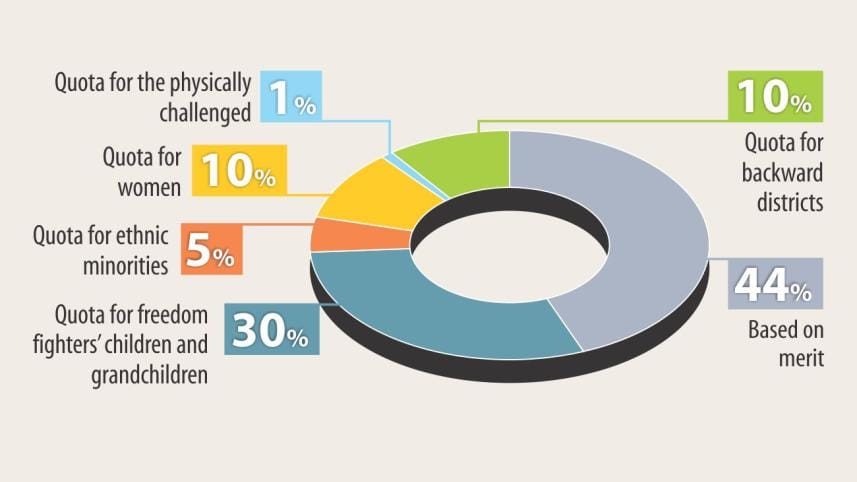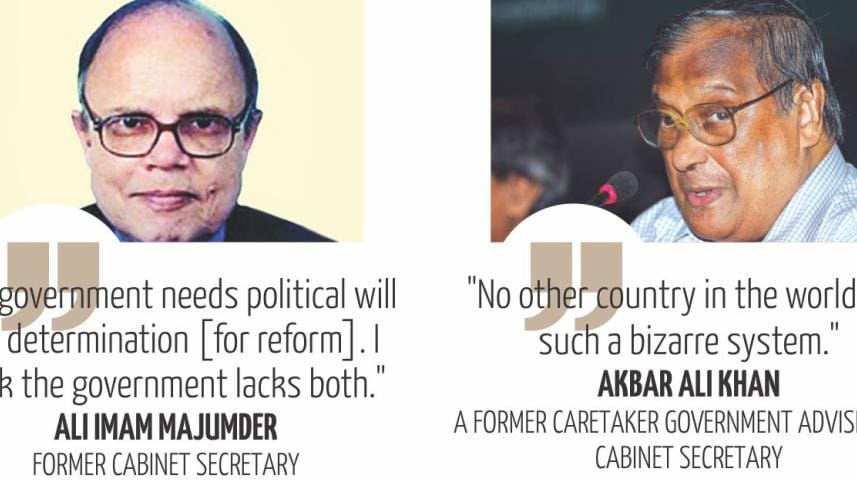Civil Bureaucracy: Quotas pushing it downhill

Jayed started preparing for the BCS exams months before his honours final tests in 2014. His hard work and perseverance paid off. He passed the preliminary and written tests of 35th Bangladesh Civil Service examinations held in 2015.
The next thing to face was the viva voce, which Jayed had done quite well in and started dreaming of becoming a civil servant, a much sought-after job in Bangladesh.
But he did not make it.
Upset yet undeterred, Jayed took meticulous preparations again and reached the viva level, again. But like the previous time, he did not get the job.
Now he is waiting for the viva voce of 37th BCS exams.
Like Jayed, there are thousands of others who hold the existing quota system responsible for not getting the job a meritorious candidate deserves. Currently, only 44 percent are recruited on merit and the remaining 56 percent on privilege allocated under various quotas.
The quota system draws two strong criticisms. Firstly, it is hugely disproportionate and secondly, it remains enforced for ages. And it has left the nation with two grave consequences -- competent candidates being driven to other jobs and bureaucracy being devoid of merit in the long run.
A number of former top bureaucrats termed the system bizarre and warned that the government would be run by the mediocrities in future.
" … relatively less meritorious candidates are getting government jobs, hurting overall performance of the administration, and the problem is intensifying," former cabinet secretary Ali Imam Majumder told The Daily Star recently.
During a lecture session at Dhaka University on January 20, Akbar Ali Khan, an adviser to a caretaker government, termed the quota system the biggest problem in the cadre service.
He mentioned that there were 257 types of quotas.
"No other country in the world has such a bizarre system," said Akbar, also a former cabinet secretary.
The quota system was introduced through an executive order in 1972 and was amended several times. From 1972 to 1976, 20 percent was recruited on the basis of merit. Merit-based recruitment was increased to 40 percent in 1976 which continued until 1985 when the percentage of merit-based recruitment was upped to 45 percent.
But in 2012, one percent quota was introduced for the physically challenged, reducing merit-based recruitment to 44 percent.
The quota provision is, however, not unusual. Many countries in the world have introduced the provision to ensure representation of society's disadvantaged groups in the service of the republic.
But the quotas are applied differently, said a former bureaucrat.
In the US, those eligible for quotas are given a head start with some marks, and then they compete for the jobs with everyone else in competitive exams.

Neighbouring India also has quota provisions for different groups lagging behind (scheduled castes, scheduled tribes, other backward classes), but the government there has been facing criticism and protest over the system. The system was challenged in the Supreme Court on several occasions.
However, successive governments kept the quota system caving in to pressure and to get votes from those groups, according to media reports.
But the main problem with the Bangladeshi system is that it stays for eternity, experts and jobseekers said. Besides, allocation of 56 percent jobs on privilege is nothing but suicidal for the country, they argued.
"The quota should not exceed 20 percent of the total posts, especially for Grade-I posts as they [recruits] are involved in important decision-making process," said former top bureaucrat Ali Imam Majumder.
There was no quota system in the recruitment of commissioned army officers, he pointed out.
But sadly, that consideration goes missing for civil bureaucracy.
Of the 56 percent under quotas, 30 percent are kept for freedom fighters' children and grandchildren, 10 percent for women, 10 percent for people of districts lagging behind, 5 percent for people of indigenous communities, and the physically challenged have one percent.
"If two lakh candidates sit for the BSC exams for 2,000 vacant posts, over 1,100 posts are reserved, for which at most 25,000 people compete,” Rimon Ahmed, a jobseeker said.
"But the remaining 1.75 lakh candidates vie for less than 900 posts. Therefore, I may not be selected even after scoring 550 [out of total 1,100] whereas candidates of reserved spots may get the job scoring only 450."
A study conducted by Akbar Ali Khan and another former secretary, Kazi Rakibuddin Ahmad, also a former chief election commissioner, recommended reducing the number of quotas. The report submitted to the PSC in 2008 said the system was unjust.
When contacted, Ali Imam said there might be quota for indigenous people. Although women have progressed a lot, still there could be quota for them for a certain period of time. Even people of some districts that are economically behind could have quotas. "But those should not be in the present form."
Meanwhile, the woes of the jobseekers by merit got further compounded recently when the government once more lowered the minimum age, from 13 years to 12-and-a-half, to be recognised as a freedom fighter. It means, 47 years into independence, more grandchildren of freedom fighters become eligible for civil service jobs.
Many candidates think it is unjust.
"I'm not denying contributions of our freedom fighters. All I want to say is that a certain number [of spots] should be reserved for their [freedom fighters'] children but not such a large chunk, like 30 percent ... and the grandchildren should not get this privilege altogether," said a job aspirant, wishing not to be named.
Jayed, who is trying his luck for the third time, demanded the quota system be reformed. "In a highly competitive exam like BCS, if you earmark a huge number [of spots] for quota, the competition eventually gets tougher, shrinking the chances for regular candidates to succeed. It is nothing but discrimination," he said.
Like experts and aspirants, the Public Service Commission (PSC), which oversees recruitment of civil servants, too wants reform. But its proposals made over the years failed to engage the government.
The PSC in its annual reports have also been recommending the reforms. The latest one, released last year, said, "The commission thinks the implementation of the existing quota system is extremely complicated, hard and a matter with multivariate dimension.
"Because of the multivariate dimension of the quota system, it is impossible in many cases to select the right candidates with 100 percent accuracy."
It suggested simplification of the existing system was essential.
Also in 2009, the PSC had proposed simplification of the quota provision. It mentioned the proposal in its latest report as well.
Asked why the government was not bringing changes to the system even after repeated proposals from the PSC, Ali Imam Majumder said, "The government needs political will and determination [for reforms]. I think the government lacks both."
Contacted, State Minister for Public Administration Ismat Ara Sadique told The Daily Star that the government has no plans to reform the existing system at present but was considering the matter.


 For all latest news, follow The Daily Star's Google News channel.
For all latest news, follow The Daily Star's Google News channel.
Comments